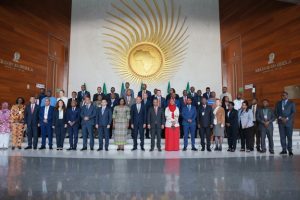
A recent study report released a week ago conducted by GSMA, an international independent institution jointly with Ethio Telecom, revealed that Ethiopia is on the right path to becoming a digital leader in East Africa. With the current journey of the digital sector development and its contribution to the national economy, the report projected that the digital economy is due to contribute over 1.3 trillion Birr to the country’s GDP by 2028.
In addition, the report projected that with the continued advancements in the telecom industry and internet access, the digital sector will contribute to creating over one million new jobs and generate 57 billion Birr in tax revenues by 2028. As of 2023, the telecom sector has already contributed 700 billion Birr to GDP, the report reiterated mentioned the development of mobile internet connections surged by 65%, with 4G network coverage expanding eightfold during the past five years.
The GSMA report titled “Driving Digital Transformation of the Economy in Ethiopia: Opportunities, Policy Reforms and the Role of Mobile” stated that digitalization of the economy is a key driver of economic growth and government revenue. Similarly, the digital sector supports socio-economic development and offers a path towards shared prosperity. The report argued that Ethiopia can achieve sustainable economic growth and structural change by leveraging digital opportunities. Adopting and expanding digital technologies across the public and private sectors, according to the report, can positively impact economic growth.
GSMA (Global System for Mobile Communications), is a global organization unifying the mobile ecosystem to discover, develop, and deliver innovation foundational to positive business environments and societal change
According to the report, thanks to the Home-Grown Economic Reform (HGER) that gives due attention to technological developments including digital transformation and the strategic investments by Ethio Telecom and Safaricom Ethiopia in the telecom industry have significantly expanded mobile network coverage and access to the internet which helped to accelerate digital growth in Ethiopia over the past five years. The expansion of advanced 4G networks across the country and the launching of 5G network services in Addis Ababa and four regional cities have facilitated digitalization rapidly during the past five years.
During the launching ceremony of the report, Ethio Telecom CEO Frehiwot Tamiru stated that the development of the telecommunications sector is accelerating Ethiopia’s economic growth by accelerating digitalization. As to her, the digital sector has contributed a crucial role in economic development during the past six years. “Telecom investments are catalyzing growth across sectors such as agriculture, manufacturing, and public services, contributing to Ethiopia’s steady economic rise,” the CEO stated.
Frehiwot stated that the GSMA assessment report on Ethiopia’s digital transformation journey and the current status of the telecom industry was conducted during the past four months to pinpoint Ethiopia’s current status in the sector based on international standards. And, she stated that the report applauds Ethiopia’s telecom sector development during the past six years which contributed a crucial role in stimulating digitalization and economic development.
“The report assesses both the development of the telecom industry, including adjacent industries, and the role of the telecom development for economic development in Ethiopia,” Frehiwot stated adding the telecom industry is contributing a crucial role for economic development. Mentioning the report, she stated that the digital sector has an 8% contribution to the country’s GDP.
Ethio Telecom CEO, Frehiwot stated that due to the continuous interventions and strategic initiatives, national internet penetration shows a significant development during the past six years. Among the changes registered in the sector is digital finance. As to her, following the launching of Telle Birr three years ago, today Ethio Telecom has around 50 million mobile money (Tele Birr) subscribers which helps the finance sector be more inclusive and accessible adding the application transacted over three trillion birr.
As to Frehiwot, the telecom infrastructure and services are expanding. Hence, to realize digital transformation, it needs to invest in awareness parallel to the expansion of services to make digitalization a societal culture. “In 2018, Ethiopia had around 37 million mobile users today, it exceeds 80 million. Interims of Internet users, in 2018, the total Internet users was around 17 million which currently reached more than 45 million and smartphone penetration was limited to 13 million in 2018 which currently exceeded 34 million,” Firehiwot stated indicating the rapid development of the telecom and adjacent sectors during the past six years. This indicated that, she stated, there is a significant improvement in all aspects, in telecom expansion, internet penetration, and advanced technologies including cloud technology that helps to facilitate digital transformation.
GSMA’s Senior Director of Public Policy for Sub-Saharan Africa Caroline Mbugua stated that Ethiopia has achieved an impressive 10% average GDP growth over the decade to 2019, adding 50 million Ethiopians are expected to be connected to mobile internet by 2028. As to the Senior Director, increased connectivity will drive growth across sectors, mentioned 140 billion Birr to agriculture and 114 billion Birr to manufacturing by 2028.
According to the study, Ethiopia’s digital strategy and telecommunication reforms create pathways for economic transformation and the objectives contained in the Homegrown Economic Reform Agenda. Developing the role of digital technologies in the economy can diversify economic activities and make economic development more inclusive and equitable distribution of benefits.
After assessing the current status of the telecom and digital industry in Ethiopia, the GSMA outlined several policy recommendations to maximize Ethiopia’s digital potential. Underscoring Ethiopia’s digital transformation as an economic driver and a pathway to greater social inclusion and sustainable development, GSMA suggested some policy reforms to accelerate digitalization and the contribution of the digital sector to the nation’s economy.
Accordingly, recognizing the positive outcomes of the policy reforms in the telecom industry, GSMA recommends full implementation of the telecom reforms agenda and adoption of digital technologies to realize digital transformation. Similarly, it recommends focusing on industry sustainability and investments in the telecommunications sector targeting new network infrastructure.
The third GSMA recommendation focuses on reforming the sector-specific taxation on mobile services and devices and implementing affordable and predictable license, spectrum, and regulatory fees to encourage investments in the sector. It also recommends strengthening the efforts in promoting mobile money and payments so as to sustainably develop the rapid rise in mobile money adoption registered in recent years. Similarly, it recommends promoting demand-side policies to expand the adoption and usage of mobile internet and mobile money.
The report stated that, in the five years since the launch of Digital Ethiopia 2025 and the start of the telecommunications reforms in Ethiopia, the number of people covered by 3G networks has increased by 50%, while coverage of 4G networks has increased by 8 times. The study also identifies further opportunities and quantifies the economic value of adopting digital technologies across Ethiopia’s economy. The study determines how the growing opportunities can be unlocked through policy reforms, particularly focusing on the key role that the mobile telecommunications sector and mobile money services play in supporting the process of digitalization.
BY DARGIE KAHSAY
THE ETHIOPIAN HERALD FRIDAY 1 NOVEMBER 2024





